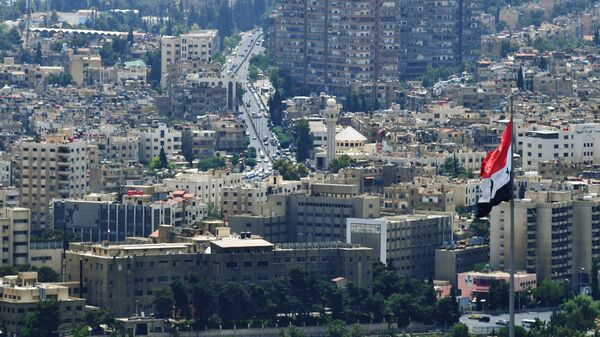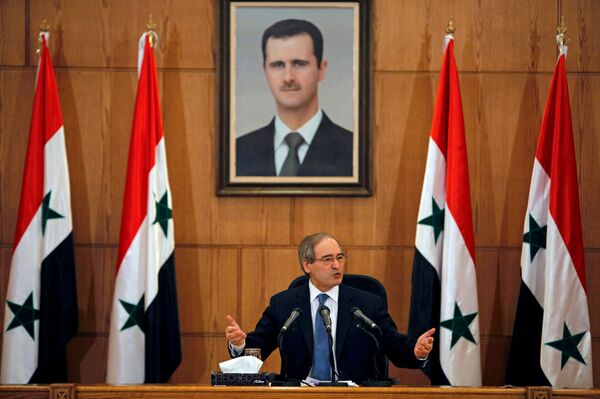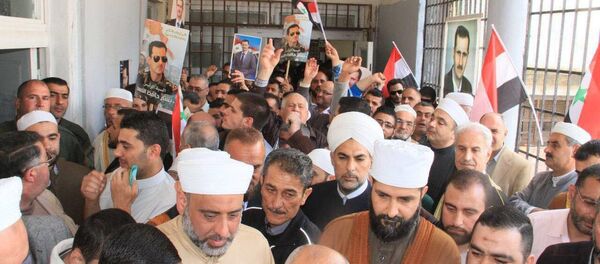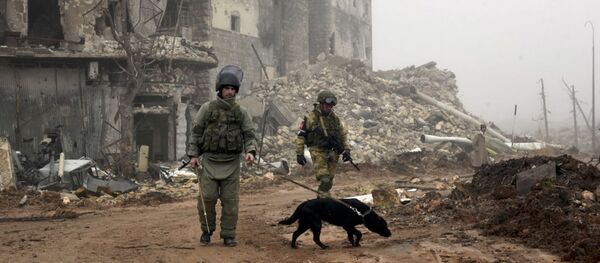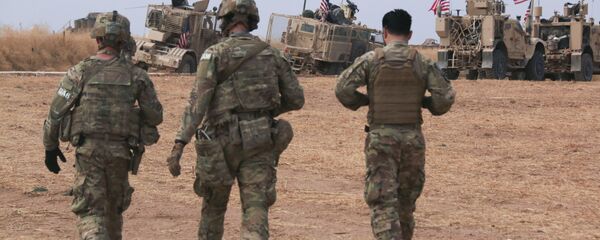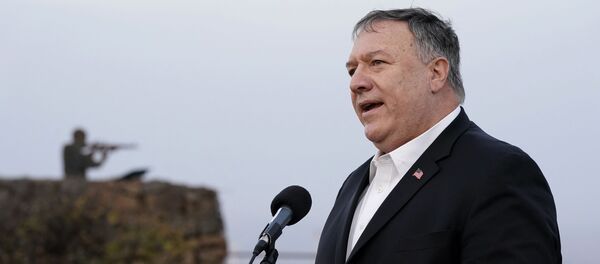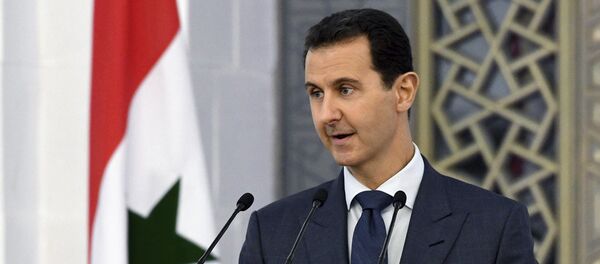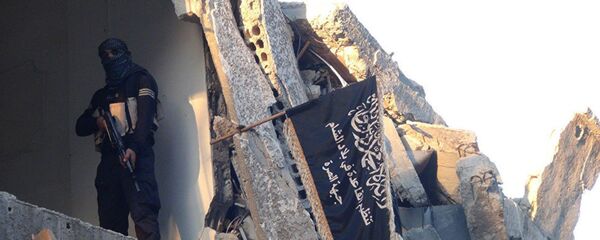Faisal Mekdad discussed the prospects for the Syrian Constitutional Committee, the challenges facing the Middle East, the return of Syrian refugees to their homeland, as well as Moscow's ongoing cooperation with Damascus.
Sputnik: The last round of the Syrian Constitutional Committee in Geneva appears to have failed to agree on any topic and find at least some common ground. What reasons do you see behind the failure of the last round of the committee’s meeting? Do you still believe in the efficiency of this format? Do you hope for any progress during the next meeting scheduled for January 2021?
Faisal Mekdad: The constitutional committee came as the result of the deliberations of the Sochi conference. We immediately took measures to contribute to the success of the efforts, we established the national delegation, and decided that the government has nothing to do with the deliberations.
We know that the people appointed should take into consideration the interests of their country, Syria, which should continue to be sovereign, independent, and should establish a constitution which serves the territorial integrity and unity of the people of Syria. Otherwise, I think we have good people who are represented in the constitutional committee.
Speaking about failure, I think it is still premature to speak about successes or failures. We wish successes take place, not failures. The issue is whether the other party has the same interest to contribute to the success of the work of the constitutional committee.
We agreed, for example, at the fourth round of discussions, that the principles on the national basis of the constitution should be the topic of the discussion. The other party was not faithful to the topic and the agenda of the fourth round, and they were discussing other issues, which shows that they are not willing to work in a good direction.
The most important thing [that] can ensure the success of the work is that this constitutional committee is Syrian-led, and should discuss issues among Syrians, and should take into consideration the interests of the Syrian people, and if the other party will commit itself to these principles, which are enshrined in the papers on the working methods of the committee, I think we can achieve something.
Otherwise, if this so-called opposition is going to be guided by foreign countries to influence the constitution of Syria, this will absolutely not be the way that will lead to a constitution that the Syrians will adopt.
Sputnik: If the constitutional committee fails to agree on a new constitution before the upcoming Syrian presidential election, which is scheduled for 2021, will this lead to the election being postponed? And if so, is there a chance that a transitional authority will be created until the elections are held?
Faisal Mekdad: It is very clear that all of us will be working on the basis of the present constitution until we establish a new constitution, and this is something that the constitutional committee knows very well. Countries are also aware that this will happen.
We cannot let the country go in a nowhere direction, which will lead to a disappearance of the entity of the country as such, this will never be allowed, so the constitutional committee will continue its work, but the elections, as decided by the present constitution, will go on, and will definitely, as a right of the Syrian people, go in the correct direction.
There will be no connection between the work of the present constitutional committee and the forthcoming elections, which should be held exactly at the time decided upon by the present constitution. But we cannot speak, of course, about failures. Why to expect failures? They will continue working, and that's what we want.
Sputnik: Damascus has repeatedly stated that the question of Kurdish autonomy should be determined by the people. When do you expect this to happen, and could it be in the form of a referendum?
Faisal Mekdad: I think that the Syrian people have decided that Syria is one country. There will be no division of the country, there will be no weakening of the country, and in fact, the Syrian population from Kurdish origins are Syrians.
We do not differentiate between a Syrian in the west, a Syrian in the east, a Syrian in the North, a Syrian in the South, all of them are Syrians, they should commit themselves to the one country.
We are not Russia, as a big territory to give special status [to regions]. This [Syria] is a country of 180,000 square kilometers [69,400 square miles]. We cannot afford having a country divided on an ethical basis, so the unity and territorial integrity of the country should be preserved.
The majority of Kurds in Syria are for a united Syria, and all the Syrian people should be for one Syria. Syria is indivisible. Those who have dreams or illusions that Syria will be divided will definitely be, not disappointed, but will not be accepted. So, the best thing is to work for a united Syria. If the Americans and the Israelis among others want to divide the country to weaken it, this will never happen.
Sputnik: Russian Foreign Minister Sergey Lavrov said on Thursday following talks with you that Russia and Syria are developing a big programme aimed at boosting bilateral economic cooperation. When do you expect the programme to be launched, and what in particular are its elements?
Faisal Mekdad: The Syrian-Russian cooperation is not born today. It was born, I am not exaggerating, centuries ago. The interlinks between Syria and Russia are old enough to encourage economic, cultural, scientific cooperation between the two countries.
In a globalised world, it is absolutely in the interest of Syria and Russia to work together for economic cooperation. We do not like economic cooperation with countries that are working on the basis of old colonialism concepts. With Russia, we feel more comfortable to have equal cooperation between two sovereign states. And this is what Minister Lavrov has alluded to.
So, there are many fields. Our military cooperation is there, our economic cooperation is there, our scientific cooperation is there. We have hundreds of Syrian students who are studying in Moscow in fact. We encourage our citizens to come to a country like Russia because we want the forthcoming generation of Syrian scientists to be educated in friendly countries rather than going to Western countries and spending the rest of their lives there.
The cooperation is going on and we would encourage this cooperation to continue with the Russian public sectors and the private sectors.
Sputnik: Are there any ongoing discussions between Damascus and Moscow on the supply of the Russian Sputnik V vaccine against COVID-19? And if so, under what conditions?
Faisal Mekdad: There are discussions about this and we hope that the Syrian people [will] use Sputnik V and other [Russian] vaccines because the Syrian people have more confidence in Russian vaccines than [in] Pfizer and other vaccines.
We are sure that the Russian people are generous enough to take all these aspects into consideration particularly under the present conditions when Syria is fighting terrorism and when Syria is being affected economically and when the infrastructure in Syria is being destroyed by terrorist actions. So, Russian soldiers and Russian engineers are helping the Syrian people to rebuild the country.
We are sure when Russia starts vaccination here they will think about their friends not only in Syria, but in many other parts of the world because the Western countries are trying to misuse such issues to control other countries.
Sputnik: Do you think there is a possibility that US pressure on Syria will rise further and result in the expansion of the US military presence in the country under the incoming Biden administration? Or, on the contrary, will the pressure ease and the sanctions be lifted?
Faisal Mekdad: Frankly speaking, we have to be very cautious. There must be a change in American diplomacy and actions in the Middle East. We believe the United States should support the liberation of Arab territories, Israel should withdraw from Palestine, Israel should withdraw from the Syrian Golan [Heights], Israel should withdraw from the remaining territories occupied in the south of Lebanon.
We should not see an American administration that is giving Arab lands to encourage Israel to establish a greater Israel in the region. These are seeds for more confrontation in the region.
Happily enough, we have Russia as a permanent member of the UN Security Council together with other countries, China is there, other fair world countries are also non-permanent members of the Security Council, which rejected such policies.
Of course, unilateral cohesive measures are criminal, they are absolutely inhuman, they only affect normal regular human beings, children and women.
So, we hope the new American administration will relinquish such policies because they are bad for the United States as they are bad for the targeted countries like Syria. We hope that they lift the sanctions immediately, today before tomorrow and tomorrow before after tomorrow, because these sanctions are inhuman.
The troops of the United States will withdraw sooner or later. It is a matter of when because Syrian resistance to any occupation is there, the will of the people to resist foreign occupation is there. It is better to leave in peace and to give an opportunity to the Syrian people to govern themselves not through the power of the United States, but through the constitutional powers of the Syrian estate.
Sputnik: Lebanese Security Chief Abbas Ibrahim visited Damascus after a trip to Washington as part of efforts to free US citizen Austin Tice, does Mr. Ibrahim play any role in meditation between Washington and Damascus?
Faisal Mekdad: A lot of friends come and go but we believe that the United States is not listening to anybody. These people have no friends, these people want to impose their hegemony wherever they can, through lies, through blackmail, through many other ways. But let’s hope that a change will take place because this is good for the United States, this is good for Syria and this is good for the entire world.
We want a peaceful world because without peace, without equal cooperation between different states, there will be no economic growth, there will be no stable international relations, there will be always matters that will disturb the peace all of us are looking for to establish more development and cooperation among friendly states.
Up to this minute, the ideas that may move between the two capitals [Damascus and Washington] through mediators have not come to the point where we can speak about serious efforts on the part of the United States to establish real peace in the Middle East.
Sputnik: Is Damascus still interested in resuming its participation in the League of Arab States?
Faisal Mekdad: We did not leave the Arab League, they froze our membership in the Arab League, and, of course, Syria is a founding member of the Arab League, a country that shoulders its responsibilities wherever there is an Arab cause. Others will miss this Syrian role, it is up to those who control these mechanisms to decide, but we have never relinquished our pan-Arab role.
Sputnik: Do you expect the Arab League to initiate this process?
Faisal Mekdad: What's preventing the return of Syria to the Arab League is the American decision not to allow Arab countries to welcome back Syria to the ranks of the Arab League. And when Arab countries decide to be free, decide to be independent, Syria will be there.
Sputnik: Syrian President Bashar Assad stated earlier in October that the return of the Golan Heights is the only condition under which Syria is willing to begin peace negotiations with Israel. Are there any plans to hold peace negotiations with Israel in the near future?
Faisal Mekdad: Since the beginning of the peace process, Syria has worked to achieve a comprehensive and just peace, a peace that's based on the Arab Peace Initiative that will ensure the return of Palestine, the building of an independent Palestinian state with Jerusalem as its capital, the return of the Syrian Golan [Heights] to the sovereignty of the Syrian Arab Republic, and the liberation of what remained in the Israeli hands from South Lebanon.
In fact, it is Israel which is rejecting these just and international principles to solve the Middle East problem, so the question should be directed to the Israeli authorities, who have rejected all efforts to solve the problem of the Middle East on a just basis.
Sputnik: As Syrian Foreign Minister, you have already paid visits to Iran and Russia. What countries do you plan to visit next? Are Iraq and Lebanon on the list?
Faisal Mekdad: All friendly countries in the world are on the list, whether they are in the Arab region, in Asia, in Africa, in Latin America, in Europe, all of them are on the schedule. Let's hope time will permit to visit these countries, and when the Americans loosen their grip on some countries, we can visit all of them, we have no problem with them. In fact, it is American pressure that has prevented visits for the past 10 years.
Sputnik: The Syrian authorities plan to reopen three of the country’s airports to international flights starting December 21. Have any airlines stated their interest in conducting regular flights to/from these airports and which destinations will flights from these airports cover?
Faisal Mekdad: The decision has been made. We welcome any airlines that would like to restore their connections and movement to Syria, whether to Damascus airport, Aleppo airport, Latakia airport. We are there to welcome any airline company that would like to restore movement to Syrian airports.
Sputnik: Before the COVID-19 pandemic, refugees were returning to Syria from Lebanon on a regular basis. Over recent days, several hundred refugees have returned daily. Do you expect these numbers to continue increasing?
Faisal Mekdad: I think the interlinkages between COVID-19 and the return of refugees is correct, because the borders were closed. I will speak only about our policy as the Syrian government. Of course, we welcome the return of our people, when these people go back to Syria, they go to their houses, if their houses are not intact they will be helped by the government, and if they don't have houses then we have built alternative housing until they return to their original places, or to the places they have decided to live in. These are our citizens, it is their right to come back.
The problem here is that some parties are trying to play games with the refugee issue. As you may be aware, they even worked against an international conference that was held last month, and prevented many countries from participating; they prevented the United Nations from participating in such a conference.
All Syrians willing to come back will be welcome. President Assad has issued no less than seven decrees allowing each citizen to come back without any problem. I don't want to name those problems, but without any single problem. They have left because terrorists were pressuring them to leave, were killing them, were torturing them, and now they can go back to their country, live in peace, and join the entire country in the economic development of the Syrian Arab Republic.
Sputnik: Do you believe the recent international conference on refugees in Damascus had an impact on the return of Syrian citizens to their homeland?
Faisal Mekdad: Many people returned, more than 1,400,000 people have returned, and we are looking for more people. But sometimes the return itself is linked to education, is linked to weather conditions, is linked to different political pressure, and even sometimes to financing.
We believe the role of the UN is to ensure the return of refugees, and this is the main responsibility of UNHCR (UN High Commissioner for Refugees). UNHCR was not allowed to attend the conference in Damascus. You can imagine to what extent the United States is pressuring the UN not to carry out its responsibilities.
Of course, we have good relations with UNHCR and are in touch with them to work together to see whether they can resume their activities vis-a-vis Syrian refugees.
In all parts of the world, UNHCR is financing the return of refugees. They are giving them a lump sum of money, $4,000-$5,000, for returning because this will definitely enable them to rebuild themselves. Except in the case of Syria, because Western countries and the United States do not want Syrian refugees to come back.
Sputnik: Do you think that there is still a need for the Russian military presence in Syria given that hostilities are almost over?
Faisal Mekdad: We have achieved common victories against terrorism. It doesn’t mean terrorism is finished because the United States is still encouraging terrorist organisations to be more active to ensure that the presence of the United States in the area is justified.
This happened in the east of Syria, this happened due to the support of separatist factions in the northeast of Syria, this is highlighted by the support given by Turkey to the Turkish occupation in the northwest and in the direct American occupation of Syria.
So the fight against terrorism is continuing in different ways and means. Because once we succeed in achieving these objectives of combating terrorism then they create more groups, more sophisticated armed groups that will continue the same battle to achieve their political aims.
Of course, this needs to be combated because Russia is not far away from Syria. Once we suffered terrorism there then Russia must take this into consideration. It [Russian military presence in Syria] is not [just] helpful, it is needed.
Sputnik: What are the estimated numbers of terrorists active in the Idlib de-escalation zone, and when do you expect the zone to be finally fully liberated from terrorists?
Faisal Mekdad: In fact, this part of Syria is occupied by terrorist groups supported by the Turkish government. And all of these organisations are on the list of terrorist entities of the United Nations but nobody is making Turkey accountable for its support of these terrorist gangs.
Sometimes they separate between the so-called terrorists and peaceful armed groups. I really don’t understand what do they mean by that but in this part of Syria, a lot of terrorist groups are still very active and supported by the Turkish government.
I am sure the Syrian and Russian armies would end this in a matter of days but the Turkish way and the way the United States is supporting these groups are not allowing us to achieve full success in eliminating the presence of these terrorist groups in the northwest of Syria.
We want to eliminate them as quickly as possible.
